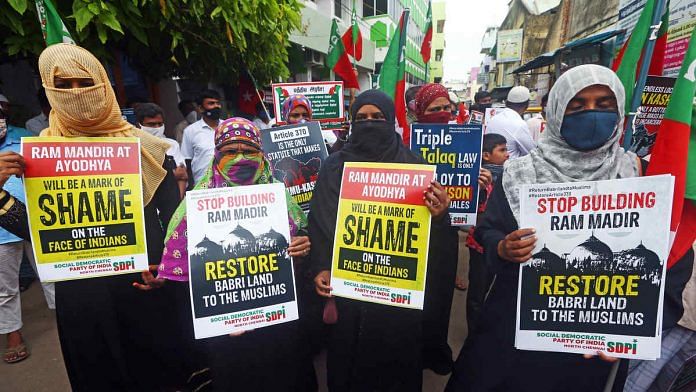Bengaluru: The Social Democratic Party of India (SDPI), the political arm of the Kerala-based radical Muslim outfit Popular Front of India (PFI), has compared itself to the Rashtriya Swayamsevak Sangh (RSS), saying if it is banned, it will bounce back and become stronger, just as the pro-Hindu organisation did after being banned three times.
Several SDPI leaders were among the 206 people arrested by the Bengaluru crime branch for Tuesday’s riots, which left three dead and several injured, including policemen. Muzammil Pasha, the Bengaluru district secretary of the SDPI, is one of the main accused.
Asked about the ban “looming” over the organisation, Dr Tasleem Ahamed Rehmani, national secretary of the SDPI, said they aren’t afraid as they have done no wrong.
“The RSS has been banned several times, and emerged stronger. We will also stick by our ideologies and principles of being of service to people, and emerge stronger,” Rehmani told ThePrint.
Karnataka’s Deputy Chief Minister Dr C.N. Ashwath Narayan said the state has enough proof against the SDPI, and that a decision on the ban will be taken soon.
Another minister, C.T. Ravi, told ThePrint that the fact hundreds of people were mobilised with weapons inside an hour indicated the violence was pre-planned.
“They had some agenda and they were waiting for a chance to cause communal tension. The PFI and SDPI are anti-national organisations and they should be banned immediately,” he said.
However, Rehmani defended the SDPI, saying: “The Jharkhand government tried to ban us. The case did not stand for even six months. Rather, the courts quashed the decision and came down heavily on the government. They banned us in 2019. We are named in incidents, but each time, there is no evidence to back those allegations.”
Also read: Congress ex-corporator among 60 more arrested for Bengaluru riots over Prophet post
What is the SDPI?
The SDPI is one of the many organisations under the umbrella of the PFI, which has been on the National Investigating Agency’s (NIA) radar for its alleged involvement in several political killings, forced religious conversions, and even links to the Islamic State.
Registered with the Election Commission of India on 13 April 2010, SDPI claims to be founded on the premise of “advancement and inform development of all citizens, including Muslims, Dalits, backward classes and Adivasis”.
The SDPI has a presence in six states — Kerala, Tamil Nadu, Andhra Pradesh, West Bengal, Uttar Pradesh and Karnataka — and the National Capital Territory of Delhi. Its candidates have contested elections at gram panchayat, corporation, assembly and parliamentary levels.
Its website states it contested 30 parliamentary seats in 2019 — all 20 in Kerala, 4 in West Bengal, 3 in Tamil Nadu, and 1 each in Karnataka, Andhra Pradesh, and Madhya Pradesh.
Apart from this, SDPI contested three assembly seats in Andhra Pradesh — Kurnool, Nandyal, and Nellore.
“We plan to contest in the upcoming Bengaluru corporation elections as well. Though we may not be able to convert our mass support into votes, we know that we have the strong backing of our cadre,” Rehmani told ThePrint.
Also read: BJP blames radical PFI’s political arm for Bengaluru riots, police say investigation on
Accused in attacks and mob violence
The SDPI is being probed for multiple incidents that have occurred in the last few year. In December 2019, during the anti-CAA protests in Mangaluru, the police had collected crucial evidence showing that provocative messages were shared by groups affiliated to outfits like the PFI and SDPI to incite violence.
The FIR named 77 people, many with direct links to SDPI, then-Mangaluru Police Commissioner S. Harsha had told ThePrint.
A month before that, Congress MLA Tanveer Sait was brutally attacked by a youth later identified as Farhan Pasha, who had close links with the PFI, SDPI and the Karnataka Forum for Dignity (KFD).
Three years earlier, local RSS leader Rudresh was hacked to death in broad daylight by two men riding a motorcycle in the Shivajinagar area of Bengaluru. The police arrested the Karnataka PFI president in connection with the killing, and then-state home minister Dr G. Parameshwara, told the assembly that the main accused Asim Sharief and four others had links with the Indian Mujahideen, SDPI, PFI and Al Ummah.
A senior police officer investigating the 2016 case said: “We had found enough evidence to link Rudresh’s murder to the SDPI, which we mentioned in the chargesheet as well.”
But Rehmani alleged there was a binary being created in India for the last 40 years, where people were being indoctrinated with ideas that “a particular community” was involved in terrorist activities.
“Thousands of youth have been arrested across the country and charged with incidents of terrorism, mob violence and bomb violence. All of them have been acquitted,” he said.
Also read: ‘SDPI flag’ on Adi Shankaracharya statue sparks protest in Karnataka’s Sringeri, probe on




Today is 16th August. 74 years ago Jinnah gave a call for Direct Action. Bengal Premier Suhrawardy implemented it. Over 4000 people died. Yet no mainstream media is covering this today. Partition became inevitable. And journalists are still wondering why people believe WhatsApp forwards more than their journalism?